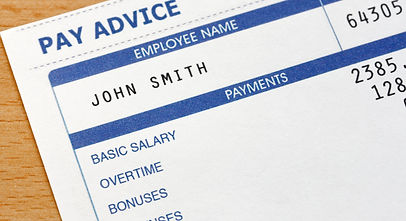

The Law Office of
Heather A. Harwell, PLLC
Serving Wesley Chapel, New Tampa, Zephyrhills, Dade City, Land O' Lakes & Lutz
Free Telephone or Video Consult
GARNISHMENTS
Once a lawsuit judgment is entered against you, the creditor holding the judgment may seek to execute (collect) the judgment by either garnishing your paycheck or attaching your bank account. The creditor is not required to notify you until after the

GARNISHED
garnishment or attachment process has begun and your employer is notified or your bank account is frozen.
GARNISHMENT AGAINST WAGES. The creditor will motion for a continuing writ of garnishment against your wages. The clerk will issue a writ of garnishment which is then sent to your employer. Your employer will file an answer as the garnishee providing information regarding your salary and the intended garnishment amount. Once this occurs, you will then receive your first notice of the garnishment together with instructions on how to file a claim of exemption to the garnishment and request a hearing to prove your exemption. If you do not have a qualified exemption, a judgment for the garnishment will be entered. A garnishment may not exceed 25% of your net income after taxes and involuntary deductions. The amount of garnishment is also limited to the amount of your weekly net salary that exceeds 30 times the Federal minimum wage of $7.25 which is $217.50. A garnishment does not follow you to a new employer. If you change employers, the creditor will have to go through the process again.
GARNISHMENT OF BANK ACCOUNT. A judgment holder may attach most property that you have, excluding your homestead exempt property. However, creditors usually attach bank accounts because the process is easier and the creditor does not have to sell the property to get its money. The creditor will have had the benefit of reviewing your bank statements and determining at what time of the week or month the balance is highest. This is usually the time when the garnishment will occur and the account will be frozen. Banks are required to freeze the account for twice the amount of the judgment. The creditor will motion for garnishment of your account and the clerk will issue a writ of garnishment which is then sent to your bank. Your bank will file an answer specifying the amount frozen. Once this occurs, you will then receive your first notice of the attachment together with instructions on how to file a claim of exemption and request a hearing to prove that the writ should be dissolved. As with a garnishment, if you do not have a qualified exemption, a judgment for the attachment will be entered.
EXEMPTIONS. You must file a claim of exemption within 20 days of receiving notice of either the garnishment or the attachment. The only exemption defense to salary garnishment is "head of household". In order to qualify, you must be providing more than 1/2 of the support for a legal dependent. If you are married and your spouse works, this means you will need to prove that, not only do you make more than your spouse, but that you paid for more than 1/2 of the household expenses. This amount is usually determined by averaging income and expenses over the prior 6 months. If your disposable earnings are less than $750 and you qualify as head-of-household, your earnings are fully exempt. If you make more than $750 per week and you qualify as head-of-household, your earnings are fully exempt unless you have previously agreed in writing to allow garnishment, You may not even realize that you made such an agreement as it could be part of a loan contract related to the debt.
The head-of-household exemption applies to bank account attachments. The bank account may also be protected from attachment based upon the nature of the income included in the account as well as the ownership status. Federal benefits such as social security, public assistance, veterans' benefits, disability income and retirement funds are generally exempt. If the account is a joint account with your spouse and your spouse is not also obligated on the debt, then the funds are protected. However, the account must have been opened by you both at the same time while you were married and each of you must possess full control and right of survivorship.
The information provided in this website and blog page is intended for informational purposes and should not be construed as legal advice. You should never rely solely on websites for legal information or advice and contact a licensed attorney with any questions you may have.